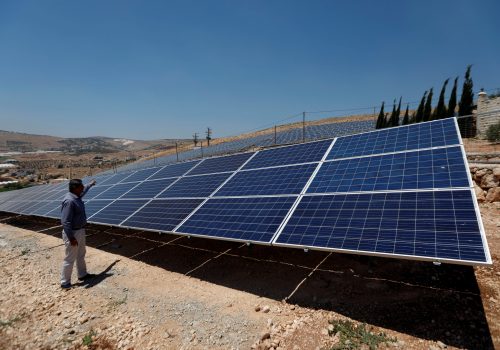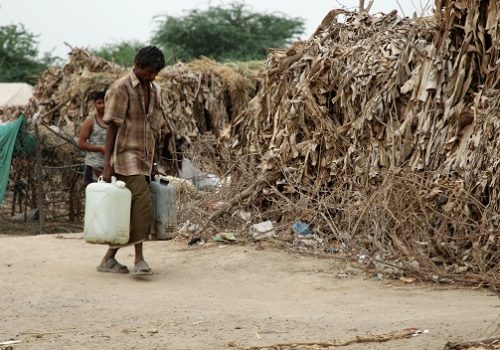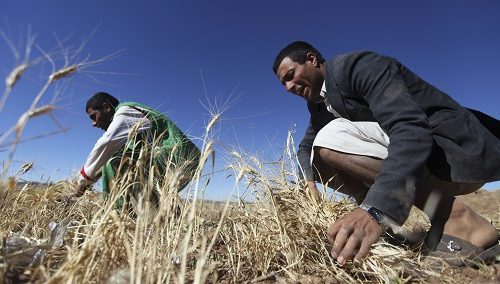The quest for water: Will the Abraham Accords change the water landscape for the region?
With the Abraham Accords signed and sealed on September 16, there have been many labels used to describe this monumental agreement. Critics in the region have called the accords an arms deal dressed up as a peace agreement—even saying that the United Arab Emirates (UAE) and Bahrain badly negotiated the deal—while supporters in the region have hailed the accords as ushering in a new era of peace and cooperation in the Middle East. Beyond normalizing relations, the peace agreement is expected to bring collaborations in various sectors, including food and water security issues.
Water scarcity remains a critical matter to the Middle East and specifically to the Gulf countries. Water resources are in short supply, even as the demand for water grows with socio-economic development and population growth. According to the World Resources Institute (WRI), thirty-three countries are estimated to suffer from a severe water crisis by 2040; half of these countries are in the Middle East, with the top ten including all the Gulf Cooperation Council (GCC) states. In order to mitigate this coming predicament, countless ideas have been thrown around. One suggestion was the importation of water from the Antarctic and other areas of the globe. However, complicated economic and technical issues proved the idea not feasible.
Chronic water problems come with their own sets of challenges. Understanding water insecurity means looking past the issue of supply shortages and into the political, social, and economic landscape. Societies depend on water for survival and its absence impacts their health and livelihood; from sanitation services to economic activities like agriculture, energy production, and transportation. When societies are unable to provide for themselves, countries will be unable to achieve economic stability and growth, which in turn leads to the inability to alleviate the impacts of urbanization, climate change, and the rise of protests that may lead to political tensions.
Consequently, water security promotes stability and plays a major role in mitigating national security threats. As a result, Gulf governments have paid increased attention to water security policies and concentrating on better water management practices and technology-driven developments, as found in the UAE’s Water Security Strategy 2036, Oman’s Vision 2040, and Saudi Arabia’s Vision 2030 Qatrah program.
With that being said, there is a strong belief among water and environmental practitioners in the field that the role of water in supporting peace in the Middle East and ending conflict is only meaningful as part of a multilateral peace process focused on a just peace and involving all core parties to a conflict. Any bilateral water projects outside of this framework are considered to be trade-focused and replace the bigger picture of peace with quick economic gains.
Fortunately, there have been several multilateral efforts in the past to ensure regional cooperation in the field of water security. One successful example is the Working Group on Water Resources (WGWR) that came together after the US-led post-Gulf War peace process in October 1991, known as the Madrid Principles. Regional integration was prioritized and one of the results was five multilateral working groups established on issues of shared concern, including water security. With the United States as chair, and Japan and the European Union as co-organizers, WGWR has been credited with far more tangible achievements than any other working group—namely, the Declaration on Principles for Cooperation on Water-Related Matters and New and Additional Water Resources, the creation of a regional water databank, and, of course, what was coined the “crowning glory of the entire process”: the establishment of Middle East Desalination Research Center (MEDRC).
Headquartered in Muscat, the center came into existence as a result of Oman’s proposal and was established as an institution of the peace process in 1996. Possessing a mandate to find solutions to freshwater scarcity across borders and divisions and to help the peace process, the MEDRC still continues its work through research, capacity building, and transboundary water projects, with an aim to become the regional hub for water desalination, innovation, and to facilitate greater development cooperation in regional water security.
The center could not have come at a more opportune time. In the late 1990s, Israel began to seriously consider and embrace desalination as a solution to the historic drought facing the Sea of Galilee, the country’s main supply of fresh water. The government decided to build five desalination plants, leading to a water surplus and Israel’s ability to position itself as a world leader in water management and efficiency. Through its participation in the working group, Oman became the first Arab country to engage with Israel when the two became part of MEDRC’s executive council in 1996. Among the other Arab country members are Jordan, the Palestinian Authority, and Qatar. In the cases of both Gulf countries in MEDRC, cooperation on water resources and desalination are fundamental to their respective pursuits of relations with Israel.
However, outside the multilateral framework, there have been neither official GCC-Israel or bilateral GCC member state-Israel water agreements nor active water research cooperation between universities before the Abraham Accords were signed. Still, such collaborations could be possible in the very near future. As of now, there is no significant capacity gap on water between Gulf states and Israel. The market on water technologies and systems is already completely globalized and the best-in-class desalination plants and systems in operation in the Middle East are as good as anywhere else in the world, which poses the question on the type of cooperation that would be anticipated in light of the accords.
The expectation is that water cooperation will mostly be focused on the startup ecosystem, especially given Israel’s reputation of being a “startup nation.” Some examples include BlueGreen Water Technologies, which works on transforming algal bloom treatments into efficient, eco-friendly solutions, and WaterGen, which works on producing clean drinking water from air. There also may be an effort to cultivate further scientific research cooperation pertaining to water management practices, where universities collaborate through students and research exchanges to strengthen their water research capabilities and promote further investments in the sector.
With the threat of climate change already creating direct consequences for water security and conflict, safeguarding water for the region will prove to not only be a challenging task, but an even more crucial one than during the last multilateral efforts in the 1990s. The GCC countries will only be able to satisfy 23 percent of their 2050 water demand with their existing resources, making inter-regional cooperation crucial. The WGWR stated it well in the mid-1990s and it still stands true today. The report reads: “in the absence of progress on the core issues dividing the sides, progress might be made on common concerns unrelated to the core issues.” Perhaps a new working group tackling this mutual interest, combined with environmental and climate change issues, could make further progress on addressing critical matters that effect all parties involved.
Rumaitha Al Busaidi is an Atlantic Council Millennium Fellow. She is also an Omani marine scientist, and a multi award-winning environmental advocate focusing on climate change and its impacts on the Middle East. Follow her on Twitter: @RumaithaBusaidi.
Image: Yotam Steinberg from Kibbutz Maagan holds his stand-up paddle board as he enters the Sea of Galilee, northern Israel November 8, 2016. REUTERS/Ronen Zvulun


